Exclusive: Greater Manchester Police Block FOI Request on Rochdale Station Attack
Another police force, another "non-sensical" non-disclosure.
Greater Manchester Police (GMP) has partially blocked a Freedom of Information (FOI) request seeking details of its investigation into the attack on Rochdale Police Station last year.
The incident took place two days after a “brawl” at Manchester Airport on 23 July 2024, where a 14-second clip showed a white police officer kicking the head of a man of middle eastern ancestry on the floor.
Days later, dozens masked men assembled outside the police station declaring GMP was “institutionally racist”, with some throwing eggs, kicking windows, and making vague threats.
They were also heard repeatedly shouting, “Allahu akbar”. Such chants were made in unison by a majority of the participants, so it wouldn't be a far cry to consider the event a partially religiously-motivated attack.
Just as the violence that broke out at some of the Southport riots last year, their conduct was illegal, constituting clear criminal damage and violent disorder.
But there was a spanner thrown in the works. It turned out that the Manchester Airport clip was quite deceptive, and that’s putting it mildly.
Released days later, the full CCTV footage revealed Mohammed Amaaz (wearing light blue) to be the clear aggressor, throwing the first punches, assaulting two female officers, and subsequently breaking PC Lydia Ward’s nose.
Put simply, the men at Rochdale station had jumped the gun. Presumably thinking it was their George Floyd moment, they rose to fight "prejudice". But they got it wrong. One might say disturbingly so, given GMP’s systematic failure in tackling cases of genuinely racist sexual abuse, not against ethnic minorities, but young white girls.
There was, and still is, categorically no evidence officers acted out of racial prejudice. They were responding to an initial report of assault—an allegation a jury has since upheld in convicting Mohammed Amaaz. Both he and his brother, Amaad Amaaz, resisted arrest.
Despite the footage of violent disorder, criminal damage, and vague threats at the station circulating widely, there was remarkably little coverage of the event and GMP’s response in comparison to the Southport protests, or indeed, the Manchester airport assaults.
The force did issue a public notice displaying images of suspects they wished to “speak to,” but, ironically, also claimed that the “protest” had ended “safely and without incident.”
Roughly a year on, The Brief submitted an FOI request seeking incident reports, details of any investigation, and confirmation of whether anyone had been identified, cautioned, or arrested.
To GMP’s small credit, this week they disclosed some information, confirming that officers arrested 20 individuals following the incident.
They also provided an incident report which, if intended merely as a summary, may be excused for its brevity. However, if it is the full report, it suggests that GMP’s record-keeping lacks considerable detail—enough to worry residents.
It is what they omitted, however, that many may find most concerning.
GMP refused to reveal whether any of those arrested were subsequently charged, blocking the information under Section 30 and 40 of the Freedom of Information Act (2000).
Section 30 of the FOI Act relates to “investigations and proceedings conducted by public authorities.” It essentially permits public authorities to withhold information if it relates to an ongoing criminal investigation.
Section 40 pertains to personal information. The exemption allows authorities to refuse requests if the release of certain information would potentially breach data protection laws.
GMP further clarified:
“To publicly release information from an investigation that remains open may seriously undermine GMP’s ability to complete the investigation to a full and correct conclusion.”
It is unclear how the disclosure of a charge could affect a force’s ability to arrive at the “correct conclusion”. A charge would infer they had already reached one.
Equally, the disclosure of an absence of a charge is arguably as revealing as the revelation of an ongoing investigation. The excuse simply doesn't hold.
It becomes even more curious when compared to how other police forces swiftly and publicly announced charges against dozens of Southport protestors and rioters last summer, without it appearing to affect their ability to arrive at a “correct conclusion.”
Of course, we know they did so in order to “punish and deter”. So why not here?
Only yesterday did we see confirmation from the Metropolitan Police Service that they’ve formally charged 8 people over the very limited violent disorder at the Unite the Kingdom rally on 13th September.
That took two days. We’re over a year since the Rochdale event.
Noting that GMP might rely on such exemptions, The Brief deliberately clarified in the FOI request that it did not seek any personal or identifying information.
So, although the force was explicitly informed that any personal information could be redacted, they still cited it as an exemption.
After posting about the response on X, some have questioned whether this is yet more evidence of two-tier justice.
Here we have two incidents involving violent disorder, separated by only a few months. Yet it is the majority white suspects who receive very swift and public prosecution announcements—not to mention, swift prosecutions.
Observing the recent actions of GMP provides further context as to potential political bias.
In February, allegations emerged that the force had recklessly doxxed a man named Martin Frost by publicly releasing his home address following his arrest for burning a Quran near the Glade of Light memorial.
The Glade of Light is a memorial dedicated to the victims of the 22 May 2017 Islamist terrorist bombing at Manchester Arena. The attack, carried out by Salman Abedi, claimed the lives of 22 people, including ten individuals under the age of 20 and eight-year-old Saffie-Rose Roussos.
Officers arrested Frost on suspicion of a racially or religiously aggravated public order offence after bystander, Fahad Iqbal, said he felt “shocked, disgusted, and offended.”
Frost described the act as a show of solidarity with Salwan Momika—an Iraqi activist who was murdered in Sweden on 29 January 2025 after burning the Quran.
Commenting on the incident, critics later argued that GMP may have put Frost’s life in danger.
Skip forward a few days, and two plain-clothed officers visited Helen Jones, a 54-year-old school administrator and grandmother from Stockport, at her home after she called for the resignation of a local Labour councillor on Facebook.
Yes, this really happened.
The officers knocked on her door within 48 hours of receiving a complaint about Helen’s post. No crime had been alleged. The officers were acting on a reported “hate incident.”
It followed Labour’s WhatsApp scandal earlier in February where Andrew Gwynne MP sent a message to party colleagues on a group chat, stating that he hoped an elderly constituent would "die before the next election”.
When confronted about the incident, Chief Constable Stephen Watson stated, “We investigate every single report of crime in Greater Manchester,” adding, “However, if it turns out the allegation isn’t valid, we will also drop it really quickly.”
In essence, he claimed his department acts swiftly to dismiss unsubstantiated reports. Yet, GMP continues to pursue investigations into social media posts, despite growing concerns over police time and resources, at a time when the region has recorded a 7% rise in knife crime.
Notably, GMP has also recently blocked another FOI request concerning officers attending reports of shoplifting.
Watson, who was appointed in 2021, has previously described himself as “anti-woke,” having openly criticised officers for “virtue-signalling” by wearing rainbow badges or taking the knee.
He has also acknowledged the systemic failures in handling grooming gangs. Under his leadership, GMP remains the only force in recent years to consistently collect and publish the ethnicity of both victims and suspects in such cases.
This was instrumental in allowing Baroness Casey to recognise the disproportion of “Asian” or rather Pakistani/Muslim-linked gangs committing child sex abuse in her National Audit.
It would be far too crude to portray Watson as just another ideologically captured chief. However, that obviously does not make him immune to scrutiny. Ultimately, the responsibility for operational decisions lies with him.
One might say that although he appears to be doing some solid work, the spectre of progressive ideology still haunts GMP as a whole.
Later this week, The Brief will be submitting a request for internal review, urging the department to disclose how many individuals have been charged in connection with the criminal damage inflicted on Rochdale Police Station.
As ever, I’ll keep you updated with any developments.
Do you believe our best days lie ahead?
Will you keep watching as our politicians and broadcasters push for yet more surveillance, censorship, and control?
If you want to push back—if not today, maybe someday—supporting independent journalism can (genuinely) make a real impact.
In the past year, The Stark Naked Brief reached over 120 million people on X. Sometimes, all it takes is one post—one uncomfortable truth—to wake someone up and put a dent the uniparty’s monopoly.


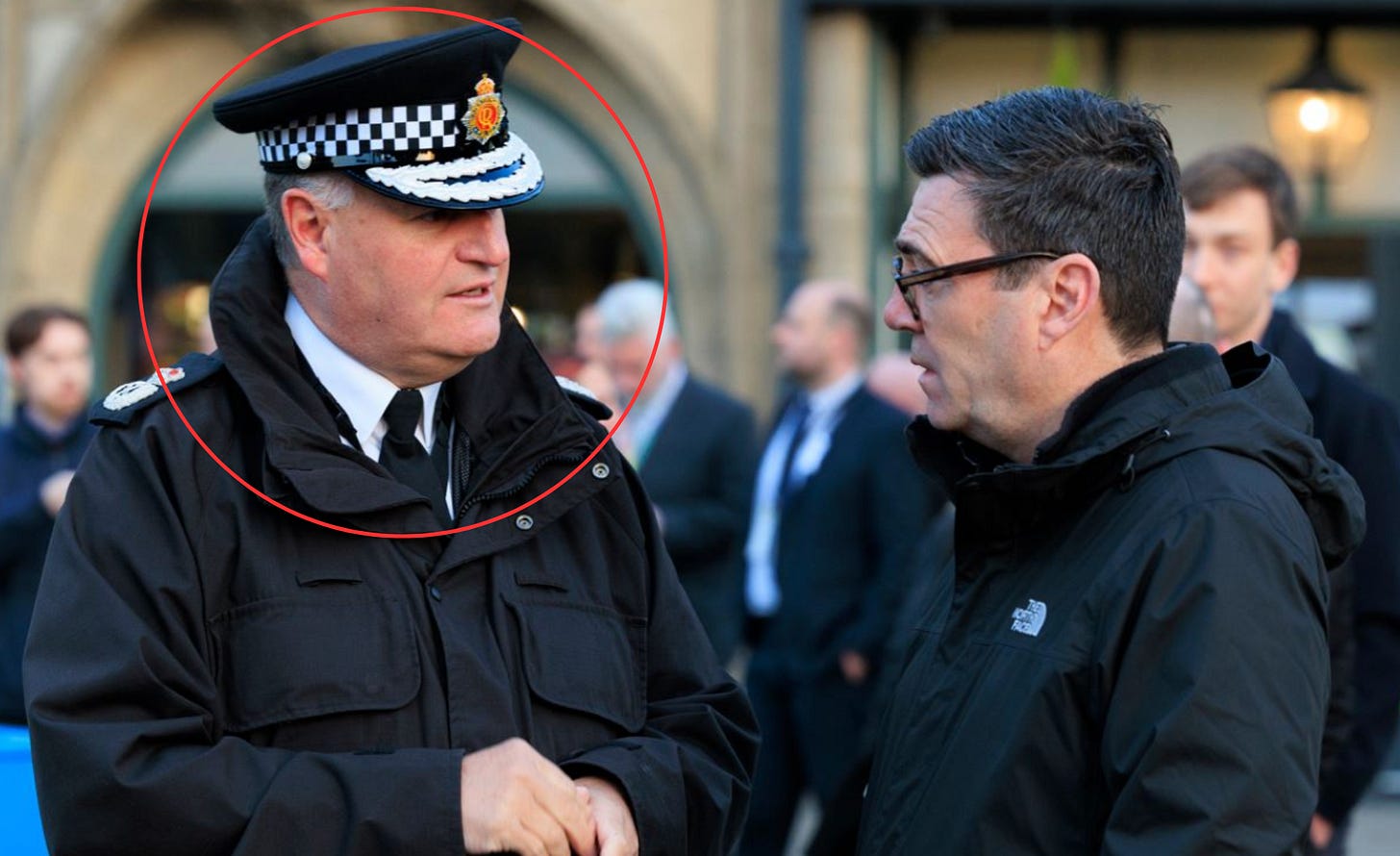
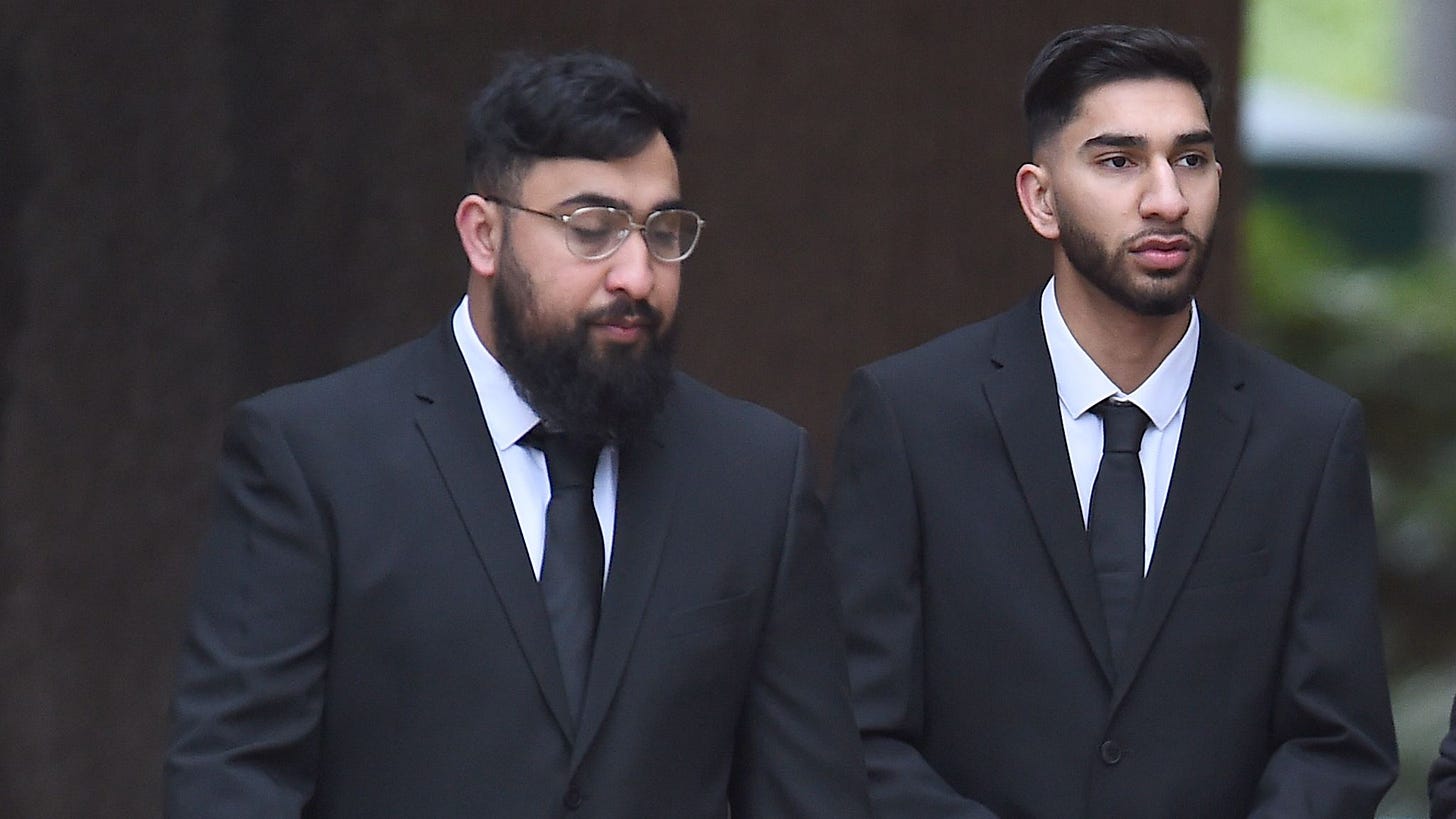
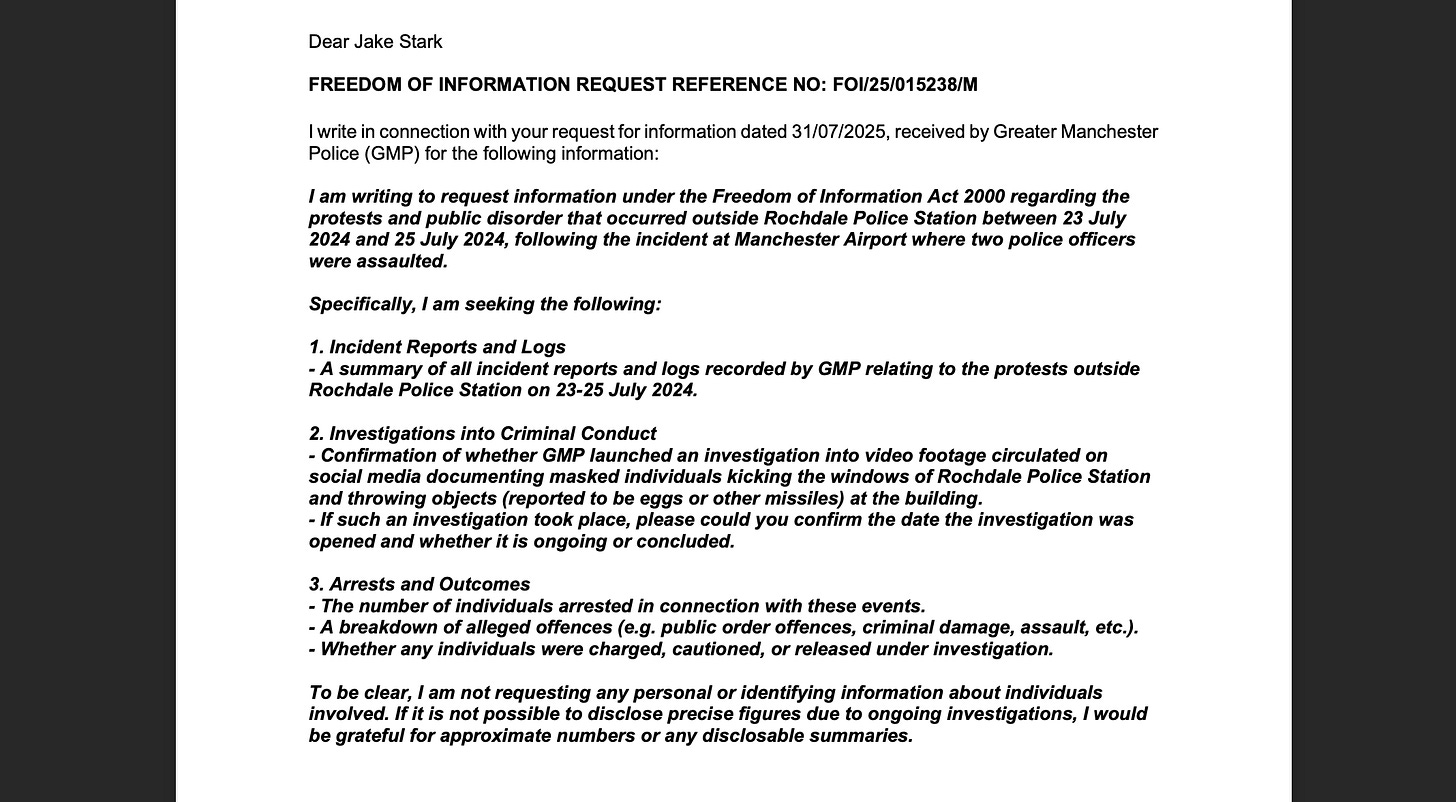
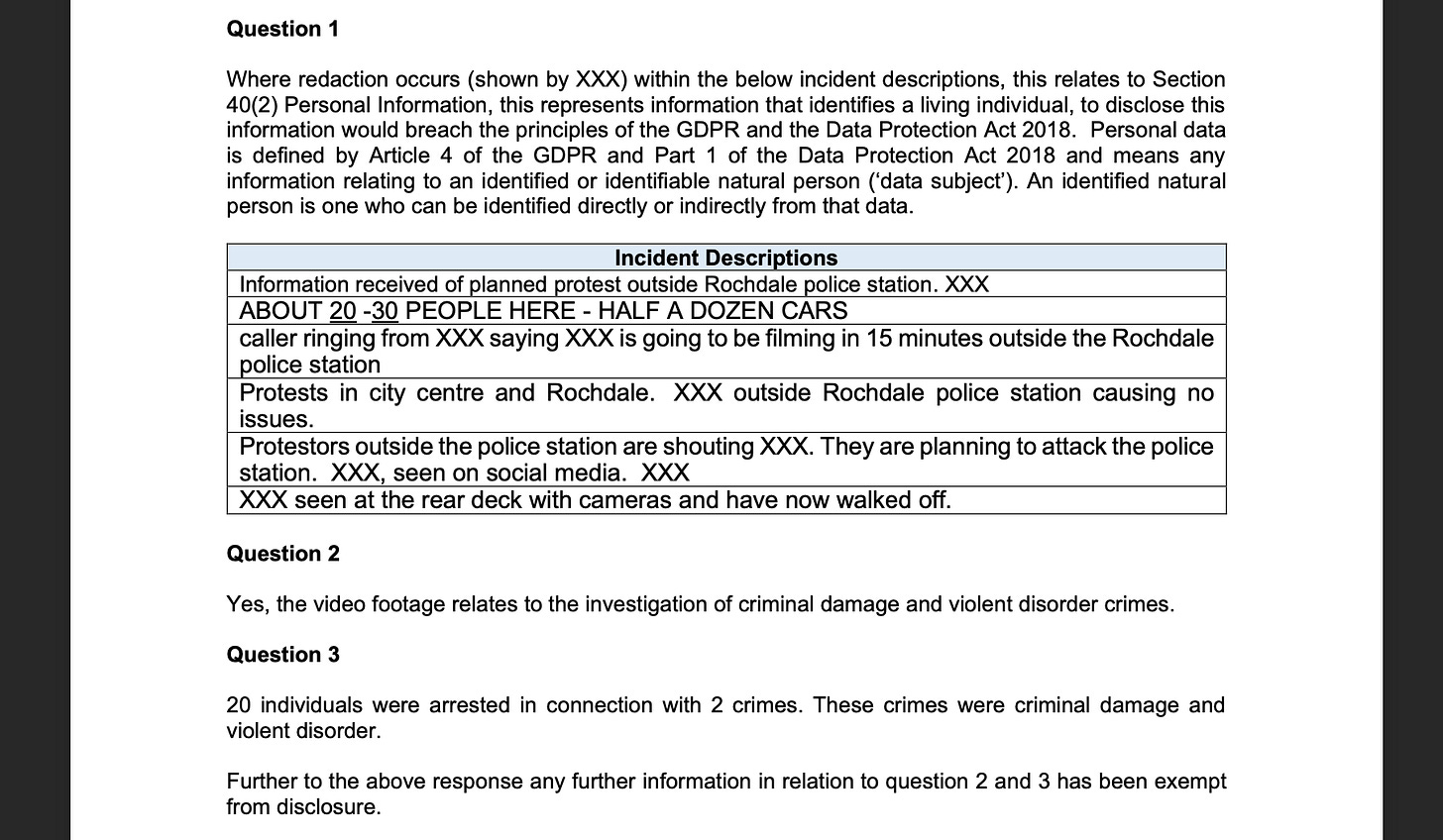
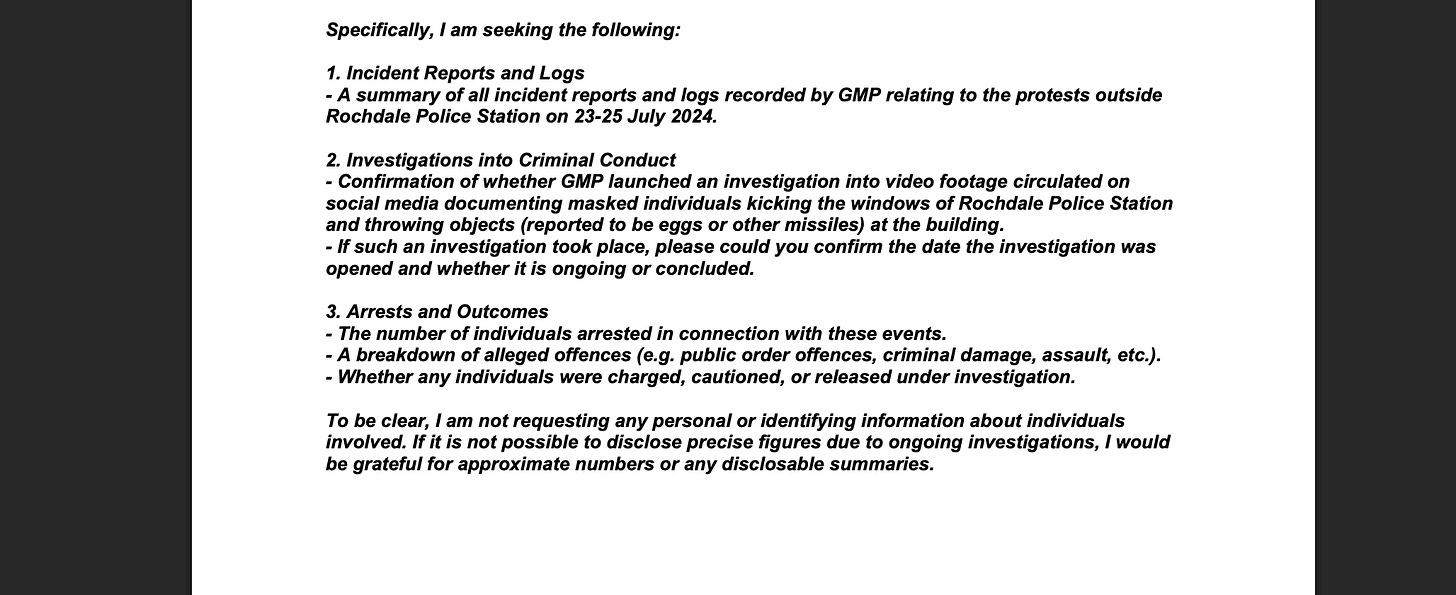
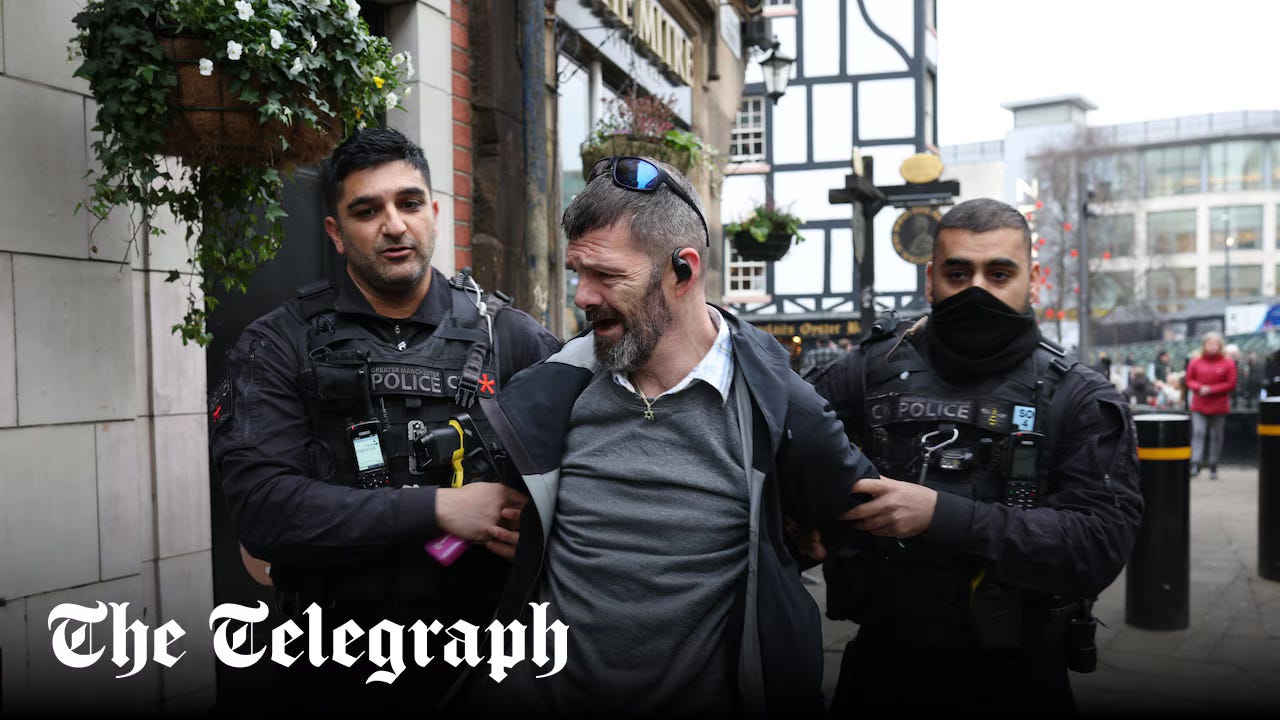


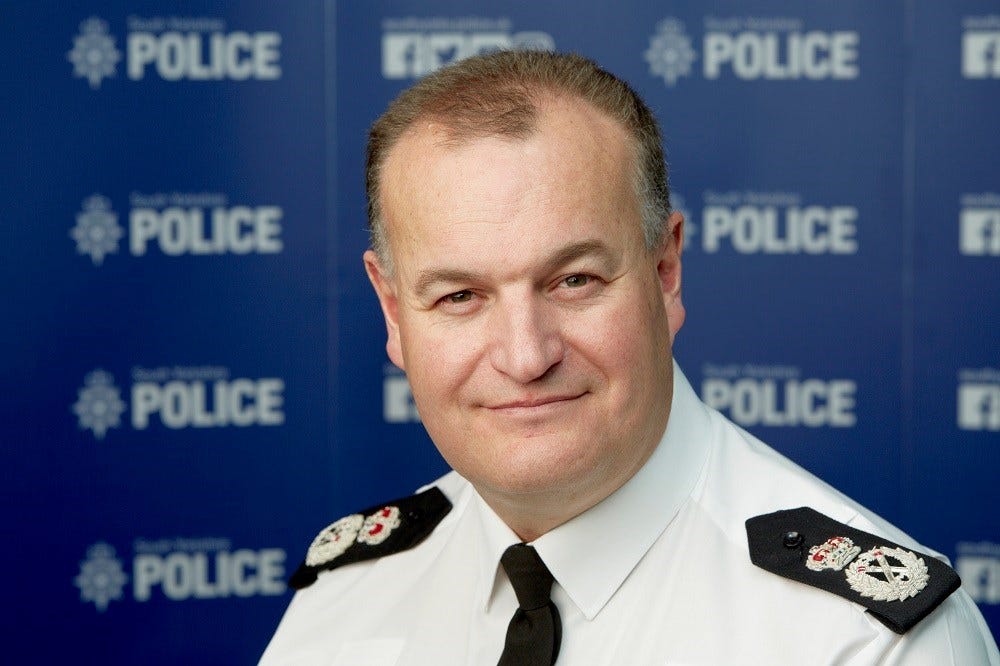
In the picture of Frost being arrested, it looks as if the arresting police are themselves Muslim. Given their overriding loyalty to fellow Muslims and their belief in that racist, sexist, homophobic and violence-inducing text called the Koran, I don't believe these people should hold ANY positions in public life.
Andy Burnham is an expert in cover ups. The man is a criminal and belongs behind bars.